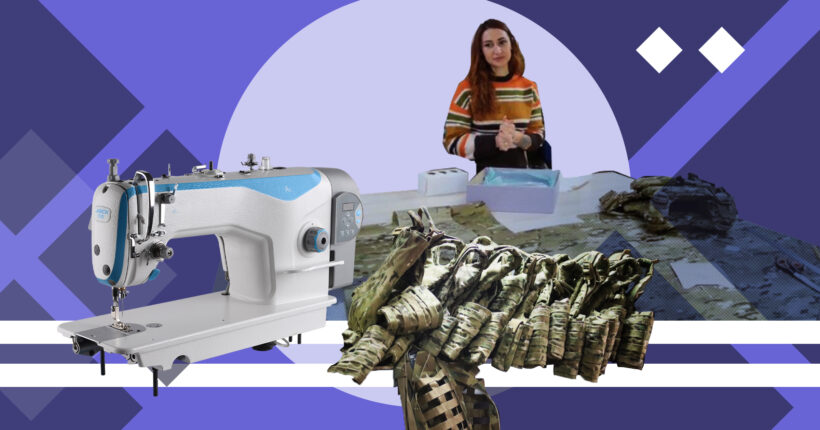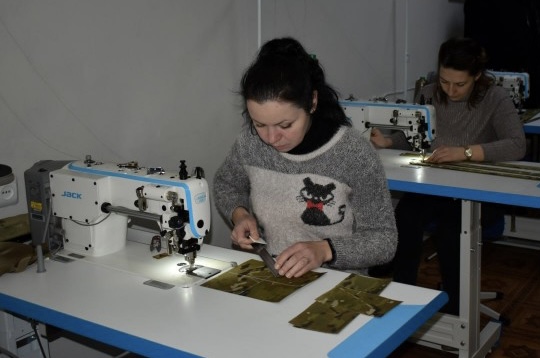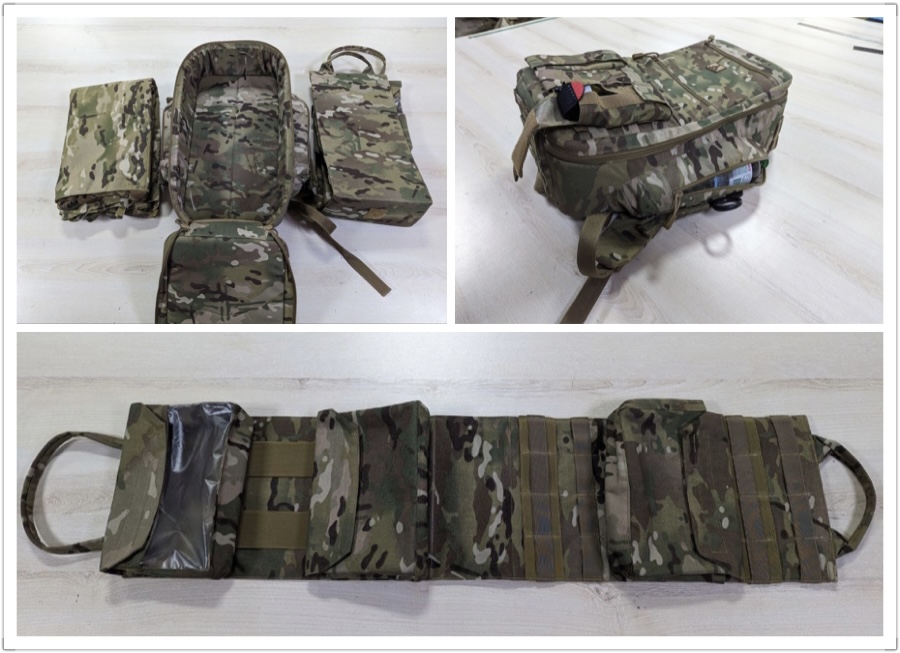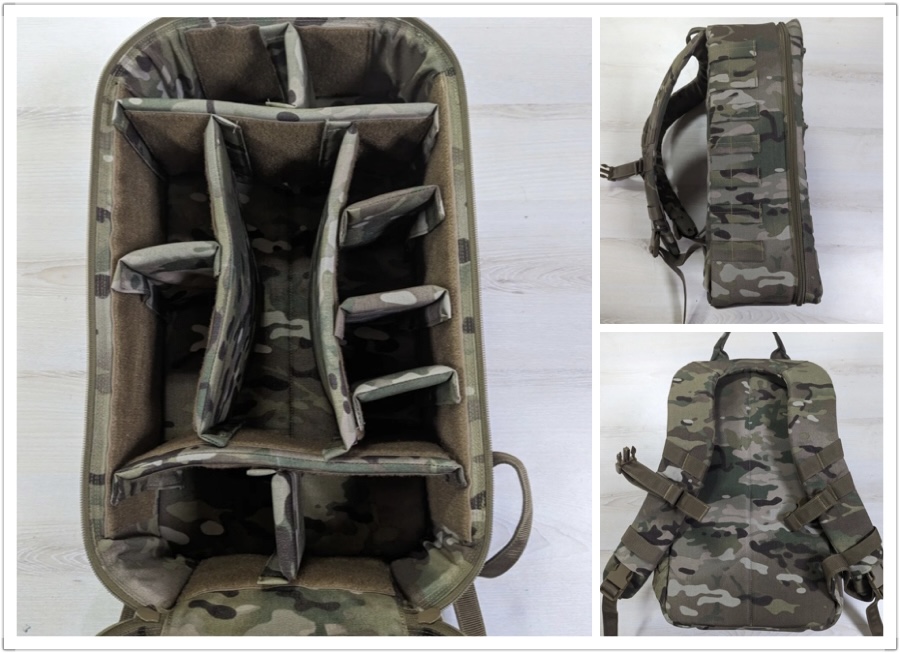
What is the problem?
With the beginning of russia's full-scale invasion on February 24, 2022, many problems arose with equipment for military personnel. This is not surprising because the size of the Ukrainian army tripled almost instantly. Gradually, the state began to cope, but volunteers have also fulfilled many requests from the military, who are fighting the enemy on the front lines.
What is the solution?

Clothes, shoes, protective equipment, plate carriers, belts, and shoulder pads are consumables at the front. Relatives of service members help cover these needs but not only by finding and buying necessary things for their nearest and dearest. For example, in Ukraine's northwestern Volyn region, Oksana Makarova, a soldier's wife, launched a whole mini-enterprise for the production of military equipment. The enterprise is engaged in sewing armored vests, backpacks, and shoulder-belt systems (SBS) for Ukrainian defenders. Rubryka looked into the enterprise's work.
"I saw how the enemy razed my city to the ground"
Oksana Makarova is a resettler from Mariupol. When russia openly attacked Ukraine, Oksana's husband was in the ranks of the Armed Forces, but she and her two-year-old son were able to leave Mariupol, which was already in flames, only in mid-March.
"Already on March 15, 2022, it was clear that the occupiers were simply destroying the city. At that moment, our apartment had no windows or heating, and the room temperature was 4° Celsius," recalls Makarova.
That day a missile hit really close to the family's house — russian troops aimed at the factory nearby. With a child in her arms, Makarova hid in the corridor, but it didn't really help — everything was covered in dust, broken glass, and debris. She realized that next time she wouldn't even have time to react. If the house collapses, no one will save them because, at that moment, there were no police or firefighters in the city. Makarova moved to another part of the city, and on March 16, a missile hit the Mariupol Drama Theater, which was used as a bomb shelter, killing about 300 people. Associated Press states the figure of 600 in its investigation. However, the exact number of the victims is still unknown as the Ukrainian investigators have no access to the war crime scene. The theater was one house away from Makarova's apartment.
Two days later, Makarova and her son left the city in a small car: "Only then was I able to contact my husband. He was relieved because he had already seen the news and thought we were no longer alive."
When leaving Mariupol, Makarova took a bare minimum: warm things, a pan to heat the child's food in the field, and a potty. Of course, she couldn't leave her pets behind.
"There wasn't even thought about any valueables. At that moment, we all thought only about life."
"There is a great demand for our products. And guys need it"

Oksana Makarova is showing the production process.
They went to visit their relatives in Lutsk. However, it was necessary to find separate housing. Makarova put an ad online: a family of 10 people — mother, son, dog, two cats, and five kittens are looking for a home. A resident of Mylushi village, not far from Lutsk, responded and offered his country house.
It took Makarova a month to recover and put her thoughts in order. What worried her the most was what she could be helpful for and what she could do during the war. Makarova's husband is a military man, so it was for him that she started sewing equipment with her own hands even before the start of the full-scale war. When she and her son ended up in Volyn, the equipment issue was once again relevant. The future entrepreneur used to seek the equipment through volunteers, but it was challenging.
Oksana applied for the "VARTO" grant, a program for wives of military service members and veterans. With this grant, she bought a sewing machine, began to sew equipment for her husband and his comrades, and sent it to the combat unit. Gradually, wives of other defenders started to contact the future entrepreneur, orders increased, and soon Makarova opened her own TETRAPOD sewing shop in Lutsk. The company's assortment includes everything the military needs: women's and men's plate carriers, SBS, shoulder bags, and raincoats.
Tactical shoulder pads are the pride of the company

Makarova's Mariupol friends who evacuated to Poland provided the first batch of materials. There they bought fabric and sent it to Volyn. Later, help came from various funds and residents of the region.
"I always say that the workshop might not have appeared if I hadn't been welcomed here so warmly. All my strength to open this case came from the people who surrounded me. I understood that I was at home and on my land. Everyone helped me," Makarova shares.
The TETRAPOD workshop has only been open since November, but the number of manufactured products already reaches several hundred units. TETRAPOD creates unique patterns. The company's employees are especially proud of their tactical medical shoulder bag and drone shoulder bag.

Tetrapod creates tactical medical shoulder bags
"We communicate directly with the military and paramedics to find out exactly what they need. There were no analogs of such shoulder pads. So we designed them from scratch, according to the defenders' wishes. The idea was to make it as comfortable, modern, and, most importantly, reliable as possible. Our bags are made of high-quality accessories and fabric and have pockets for tourniquets and a blanket," says the founder of the sewing shop.

Tetrapod creates drone shoulder bags for Ukrainian military
The sewing factory currently has three employees. However, the entrepreneur is still looking for a dressmaker and seamstress. There are not enough hands for such an amount of work. Makarova gives some of the sewn-up equipment to the defenders for free and sells some to pay for the sewists' work and the premises' rent.
"I am very motivated by what we are doing for the guys on the front lines. I feel that I am a part of Ukraine's future victory. I want the best for the guys, but if our stuff makes life even 2% more comfortable for the military, then I'm already happy. It warms my heart," says Makarova.
Even more useful solutions!

In Mariupol, Makarova had her own business — producing epoxy resin decorations. Therefore, the entrepreneur received the next grant in the amount of $6.7 thousand as part of the implementation of the government program "eRobota" for the development of her own resin workshop. Now in Volyn, she makes elegant stands and watches.
Today, at TETRAPOD, sewists work most of the time without Makarova's supervision. In the morning, she comes to help them cut the fabric and then works on resin products. This business allows the entrepreneur not only to cover her own needs but also to support the sewing industry.
"When we were in Lutsk, I understood there is a war in the country, and maybe it's not the time to build something. But I asked myself a question: what exactly can I do? At first, I wanted to enroll in medical courses. After all, I may have to go to the front myself, but I objectively understood that with a small child, I am unlikely to go to the frontline as a medic tomorrow," Makarova contemplates.
"I sat down and thought: what can I do? I can make slab carriers, I can work to pay for housing, and I can continue with the epoxy business. That is, I had a goal — to maintain the economy, and so far, I am succeeding in this. Now I create jobs, I do my favorite thing, I make products from resin, and it brings me income."
In the future, the entrepreneur plans to develop both workshops to the maximum. She says that she has come to accept that the house in Mariupol no longer exists. Her apartment burned down. The occupiers simply threw what survived out the windows, and not even a photograph of the child remained. And although Makarova is very much looking forward to the liberation of Mariupol, she accepted that, for the time being, she needs to build her life here, in Mylushi. The only thing that now warms and reminds her of a peaceful life is the cup she took when she left.
"I drink coffee from it every morning, and it reminds me of home."








